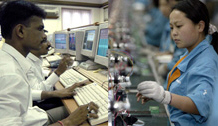
Typical street scene in Santa Ana, El Salvador. (Photo: iStock)
IMF Survey: India and China: Asia’s Giants Discuss Way Forward
March 16, 2012
- Lagarde visits China and India to meet with political, business leaders
- Asian giants try to learn lessons from each other on development
- Center of global economic power shifting toward Asia
Rising Asian giants China and India will discuss the impact of the global economic crisis on their two pace-setting emerging markets and ways of further tackling poverty and inequality at a two-day conference in New Delhi on March 19-20.

China’s (r) manufacturing-, export-led growth contrasts with (l) India’s services-, demand-driven growth (photos: Vishal Olwe, Michael Reynolds/EPA)
China/India conference
IMF Managing Director Christine Lagarde will meet with leaders from both countries during visits March 17-20. She will speak at the 2012 China Development Forum in Beijing on March 18 and will take part in the closing roundtable discussion at the New Delhi conference on ensuring strong growth in the wake of the global crisis.
While recent indicators may signal a relaxing of global economic difficulties, protracted stresses and risks—in Europe and elsewhere—pose a challenge for emerging markets in sustaining high quality growth.
Different paths
Both China and India are growing rapidly, but have taken different development paths. While China has followed a more traditional manufacturing- and export-led growth strategy, India’s growth has been driven by the services sector and reliance to a large extent on domestic demand.
Today they both face differing challenges, according to the latest IMF economic surveillance note written for the Group of Twenty industrialized and emerging market countries. “In emerging economies, the priority is to ensure a soft landing as domestic growth slows amid a deteriorating external environment and volatile capital flows,” according to the IMF note.
“There is scope to increase expenditure—including, in some cases, social spending—in economies where inflation pressure is expected to ease, fiscal positions are sound, and external surpluses are large (e.g., China). In those economies with relatively high inflation and public debt, policy space is more limited, warranting a more cautious stance toward policy easing (e.g., India).”
Sessions at the New Delhi conference will explore themes related to future development paths, financial sector reforms, and raising living standards for all by ensuring broad access to employment, quality education and health, and financial services.
Heading up
As IMF First Deputy Managing Director David Lipton underlined in a speech at the Asian Financial Forum in Hong Kong early this year, Asia emerged from the 2008 financial crisis with its global economic standing strengthened. Asia, he said, “is headed toward becoming the largest economic region in the world over the next two decades.”
But Asia has to guard against fallout from the crisis in Europe and fragilities elsewhere.
Growth in both India and China has been slowing, albeit from very high rates.
Premier Wen Jiabao this month cut China’s 2012 growth target to 7.5 percent compared with more than 8 percent in recent years and made boosting consumer demand the year's main priority. Last week, India said its economy grew 6.1 percent in the final quarter of 2011, its slowest pace in two years.
Sharing experiences
The conference, bringing together policymakers, leading academics, and private sector representatives, will be opened by India’s Finance Minister Pranab Mukherjee, followed by keynote remarks from the India and China delegations. It is hosted by the China Society for Finance and Banking, the Indian Council for Research on International Economic Relations (ICRIER), and the IMF.
Mukherjee announced a new Indian budget on March 16 in which he urged the speeding up of economic reforms in the country.
The event is part of the strengthened ongoing engagement between the IMF and Asia and one of a series of high-level events in the region ahead of the IMF-World Bank Annual Meetings to be held in Tokyo, Japan, in October 2012.







